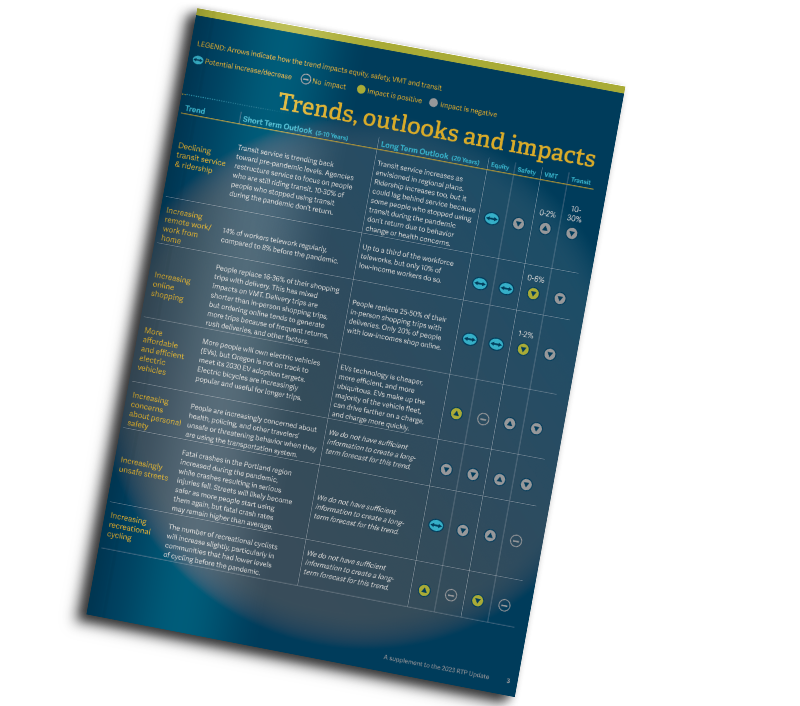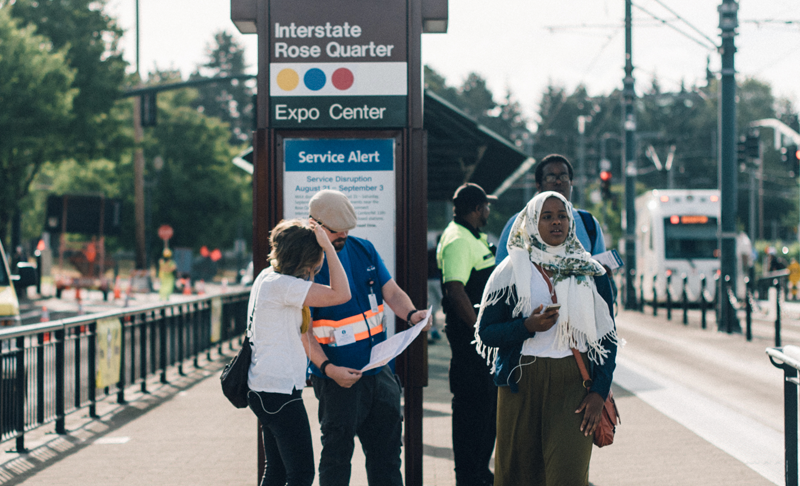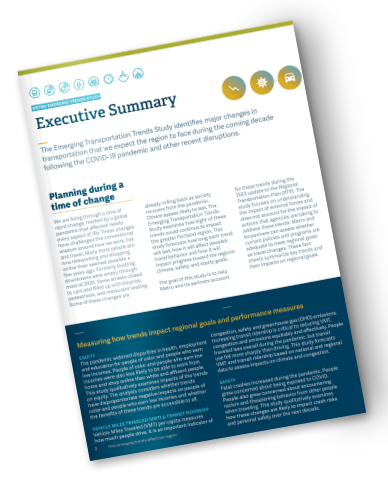Zeroing in on Transformative Trends
How One Metro Area Used TrendLab+ to Inform Regional Decision-Making
As we move through a time of pandemic recovery, we have witnessed many changes and disruptions to how we live, work, and travel. More people are now teleworking and shopping online. Once-bustling downtowns that emptied, may or may not have recovered to date. Streets that temporarily closed to through traffic to engage pedestrians, bicycles, and restaurants, may or may not have reopened to vehicles.
While some trends have begun to roll back, others now appear likely to last. Identifying how we can do things better in our “new normal” has become an important priority to help agencies guide local and regional policies and actions. Doing so helps them leverage the benefits of some of these trends and build counterstrategies for the others that may pose negative effects. It has quickly become clear, however, that traditional transportation analysis tools alone can’t provide a complete picture of outside-of-the-norm scenarios and anticipate impact across short-, medium-, and long-term periods. Travel demand models (TDMs) also have a hard time offering insights into the unexpected as they’re often set up for typical conditions and situations.
Metro Emerging Trends Study
Observing significant travel pattern changes in the greater Portland area, our client, Oregon Metro (Metro), sought to understand how these unforeseen trends could continue to impact transportation moving forward. In the process of updating their 2018 Regional Transportation Plan (RTP), Metro, along with its partner agencies, wanted to ensure that the approaching update would not only meet the shifting needs and behaviors of people in the region but also account for how investments proposed for the 2023 RTP might shape people’s travel choices.
Together, using our in-house scenario-planning tool, TrendLab+, we conducted an Emerging Transportation Trends Study to help forecast the impact of external trends and identify major changes that the region could expect to face during the coming decades. TrendLab+ produced forecasts for Vehicle Miles Traveled (VMT), climate and congestion, and evaluated impacts on equity and safety which were very important customizations to Metro. The study served as a complimentary add-on to what they already do and helped them better calibrate for the future with both high-level summaries and detailed findings behind each trend.
TrendLab+ also provided these analyses faster than modeling. Sometimes modeling might struggle to produce outputs such as ridership or VMT or might not be as accurate. This tool allows agencies the ability to put brackets around any assumptions they would make in the model by using vast amounts of data. TrendLab+ is a cost-effective measure to save jurisdictions the expense of needing to conduct numerous or extensive modeling studies.
Ultimately as travel changes, Metro is now confidently equipped to assess whether their current policies and programs are adequate to meet their RTP goals and the shifting needs of the people in their region. Connect with us to talk about how custom studies and applications of TrendLab+ can support community planning and help you meet goals more efficiently and effectively.
TrendLab+ was a great tool to help answer the many questions surrounding our first post-pandemic regional transportation plan update. The tool was easy to use when exploring several different “what-if” questions about how different levels of teleworking and online shopping might affect our regional goals. But more importantly, F&P was responsive and careful to design the tool to reflect the transportation decisions our region was facing and align it with other decision-making tools we use. As a result, our work with TrendLab+ continues to inform the development of the plan today.
Eliot Rose, Transportation Planner at Oregon Metro


Source: TriMet
Contributors

Briana Calhoun
Senior Transportation Planner

Anjum Bawa
Portland Market Leader

Jerry Walters
Principal




